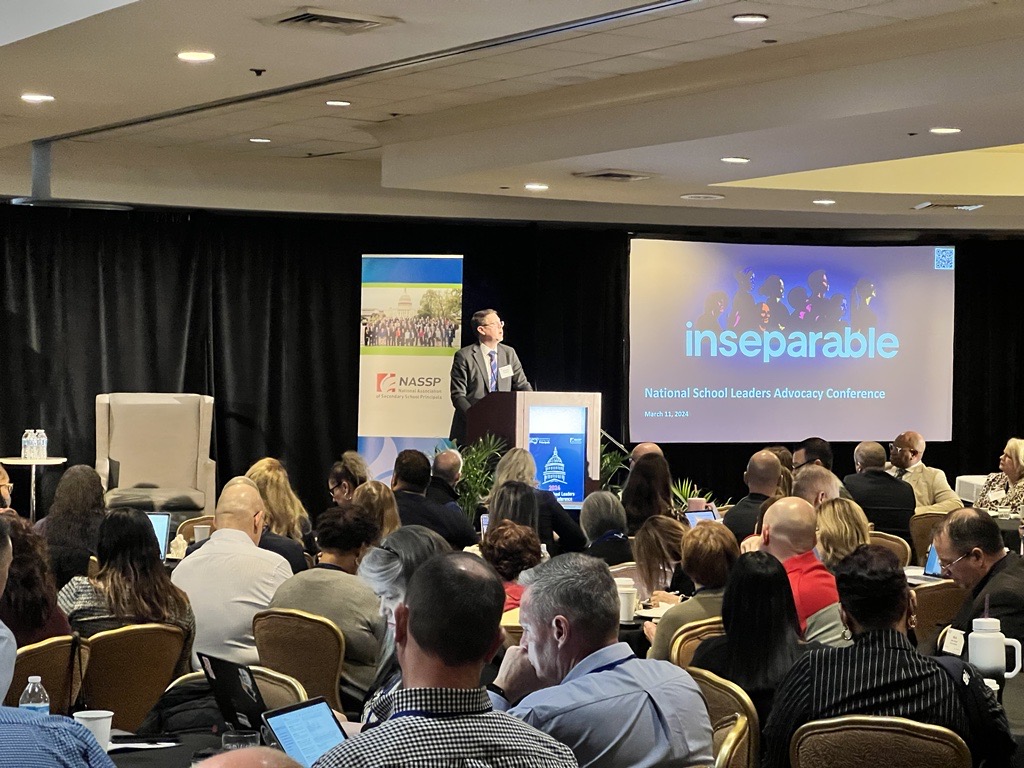Mental Health Crisis: Sharing Stories, Not Just Statistics
Mental health issues in schools aren’t new to school leaders, but knowing how to support schools with resources is new to policy makers. The good news, says Bill Smith, founder and CEO of Inseparable, research shows that the public overwhelmingly supports resources to help address the mental health crisis.

Bill Smith, a mental health expert and founder and CEO of Inseparable, opened the 2024 National School Leaders Advocacy Conference with a session on “Federal K–12 School Mental Health Policy.”
Mental health issues in schools aren’t new to school leaders, Smith said, but knowing how to support schools with resources is new to policy makers. The good news, Inseparable’s research shows that the public overwhelmingly supports resources to help address the mental health crisis—because everyone has been affected by it.
Priorities to Guide Change
The organization has identified three priorities to guide their work: youth mental health, access to care, and better crisis response. And in its extensive research of public opinion on the mental health crisis, Inseparable has found that:
- Voters nationwide believe the country faces a growing mental health crisis, think mental health care is too expensive and difficult to access, and say expanding access should be a high priority for elected officials; and
- Nearly two-thirds of voters say insufficient services in schools are a major problem driving this crisis, and there is wide, bipartisan support for expanding them in K-12 schools.
So why are school-based solutions to the mental health crisis important? Because school leaders know their kids best, said Smith, adding that the statistics are there, but policy makers need to hear school leaders’ stories more than anything.
Bedrock Insights
Inseparable, through its Impact Report: 2020-2023, has outlined the following as bedrock insights—that, unsurprisingly, align with top insights from school leaders who are on the frontlines in the effort to the combat student mental health crisis:
- Every young person deserves the chance to thrive—now and throughout life.
- Early treatment helps young people heal now and builds resilience for the future.
- Half of all mental disorders begin by age 14, but not all young people get help.
- Student and family voices are invaluable in driving school mental health policy.
The report further identifies eight criteria for measuring state-level support for mental health:
- Mental health staff in schools and districts
- School-family community partnerships
- Teacher and staff training
- Funding supports
- Student well-being checks
- Healthy school climate
- Skills for success
- Mental health education
Advocating for Mental Health Supports
As an education organization, NAESP—and its members across the country—know that there are nowhere near enough mental health professionals in schools. Smith noted during the opening session that schools should see a school counselor-to-student ratio of 1:250, but unfortunately many schools are experiencing ratios closer to 1:800 and even up to 1:1200.
One solution is telehealth, said Smith, which is especially helpful in rural communities, noting that telehealth mental health services allow for more individualized support. For example, a school outside Atlanta uses telehealth to connect Black students with Black mental health counselors.
One attendee asked: So how can we evaluate resources and get more trauma-based counselors in schools to help students?
“We’re hopefully starting to give students the skills to be resilient,” said Smith. “Let’s try to get basic resources and resilience for every student and increase multi-tiered systems of support, which is a funding question, so we have to reach out to policy makers for more support and resources.”
This is why NAESP members and their NASSP counterparts are on Capitol Hill this week to advocate for federal support, funding, and resources to help tackle this issue. Follow #PrincipalsAdvocate for updates and add your voice to amplify the message that principals and assistant principals find mental health support in schools to be non-negotiable.
Krysia Gabenski is editorial director at NAESP.




